Who would have thought we’d see Betty Draper Francis fat? Are we glad, or do we pity her? Not only is she living in that gloomy house, but now she inhabits an equally uncomfortable body. Quelle surprise!
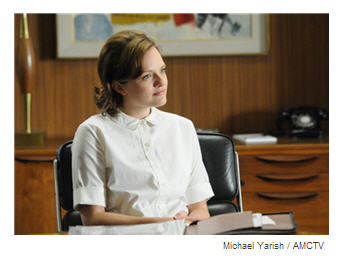 Could this episode – considered Episode 3 in fact – be offering more examples of 1960s prejudice – fully present and unapologetic?
Could this episode – considered Episode 3 in fact – be offering more examples of 1960s prejudice – fully present and unapologetic?
The first two episodes in last week’s season premiere addressed racial prejudice in a variety of ways, a glimpse at disdain for (stereotypical) homosexuality, and the usual digs at women.
What about this week? A few flickers of stigma around Don’s divorce? An ample dose of in-your-face Anti-Semitism? Even more striking – to me – was the bravely approached and rarely tapped issue of overweight, with its possible societal as well as psychological origins.
Belle-of-the-Ball Betty no longer adheres to contemporary standards of beauty. She’s fat.
So now what?
Suck it up, Betty?
Cue the juicy juxtaposition: Sally struggles to zip Betty into a dress and it’s a No Go. Betty hides in bed and declines to go out. Quick change of scene: Don zips the new Missus into her dress with ease; sultry and skinny Megan, played by Jessica Paré, heads out the door with Betty’s ex hunky hubby.
Poor Betty. She’s increasingly invisible and isolated – fat and “middle aged,” as the doctor said – at least by 1960s standards. Was he dismissive as they discussed her rapid weight gain? Is it any different today, except that a handful of antidepressants would be prescribed rather than diet pills?
Of course, Betty’s doctor does give her a physical before prescribing anything – thus he finds a nodule on her thyroid, which may be cancerous. Betty’s understandably frightened, shares the news with Don, and his concern seems genuine.
I’d Rather Be Dead Than Fat?
Ironic, isn’t it? Betty finds out that her growth is benign. She is relieved, then seconds later, miffed. It’s almost as though she’d rather be dead than fat – or at least have a medical excuse in place of the clear physical signs of distance and disillusionment in her life, carried on her body. She says, woefully: “I’m just fat.”
Henry may tell his wife she’s beautiful, but Betty makes him turn his back when she gets out of the tub. She lacks the persuasive powers of her formerly lithe self – not to mention, confidence.
They both know she isn’t who or what she was before. She may have been a bitch, but she was a thin bitch. Arm candy. Now? She may be nasty as ever behind closed doors (we don’t really know); then again, she may be kinder, including to her children. She’s certainly unhappy. Plainly, visibly, miserably so.
Peggy: I’m the One You Need to Impress
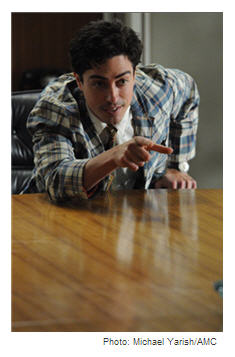 Don’t we love the directness of Peggy’s admonition to the cocky and inexperienced hot shot she interviews for a copywriter position?
Don’t we love the directness of Peggy’s admonition to the cocky and inexperienced hot shot she interviews for a copywriter position?
He’s utterly unqualified, his manner is obnoxious and stereotypically so, yet Roger insists she do whatever it takes to get him hired.
“We need a Jew” says Roger, reminding her that “everyone has one now.”
The token Black secretary? Check. The result of their prank-turned-job-opp, as an Equal Opportunity Employer.
The token Jew? Check. The result of Roger’s ridiculous reasoning.
As for the women, Joan and Peggy have been joined by Megan as occupying increasingly more interesting (and fulfilling) roles. Peggy is the one he needs to impress? Yes, and no.
Age?
Age isn’t yet the ageism of the 1990s and beyond, but we’ve seen how Burt is increasingly taking a back seat, and Roger is feeling the crush of the younger crowd making him obsolete, not to mention his way of doing business. Specifically, Pete continues to crowd him out.
Likewise, Don is feeling the separation of the generations as he waits back stage at a Rolling Stones concert, chatting with a teenager, hoping to get in with Harry to see the manager about a possible commercial. As for the Stones, did I call that or what? Okay, I thought it would be Betty listening to Mick and friends, and it turned out to be Don and Harry!
And Don isn’t feeling his symbolically creaky bones solely in the office. We see signs of his discomfort at home. Clearly, he feels out of his element with aspects of 26-year old Megan’s lifestyle, including her friends. 40 years old in 1966? That’s middle-age! And Roger? Practically ancient!
A slight digression of note, on Don’s remarriage and that of Betty: Don’s relationship with his new mother-in-law appears easy and light; Betty’s relationship with Pauline is anything but. In fact, Don’s home life in general is bright and bathed in color, while everything about Betty and Henry seems stuck, if not moribund. More kudos to the set designers of Mad Men for their choices that establish mood and lifestyle before the characters ever open their mouths.
Tea Leaves Indeed
Following a visit to the doctor, Betty lunches with reluctance, invited by an acquaintance, Joyce, whom she meets accidentally in the doctor’s office. Joyce is dying, and Betty doesn’t yet know her own fate. But she agrees to a moment of having her tea leaves read, and she is told:
You are important to people around you… You are a rock.
Betty begins to cry, fearing she’s awaiting a death sentence, though by the end of the episode we know the tumor is benign. We see a quiet family scene outside the Great Gothic Horror of a House, as Bobby and Sally play with sparklers, Betty holds Baby Gene on her lap, and Henry is sitting by her side.
Do the tea leaves predict a more solid Betty to come – emotionally? Will this experience of her mortality increase her awareness of time, of her actions, of their consequences? Does she have a shot at becoming important to the people around her – or realizing that she is already?
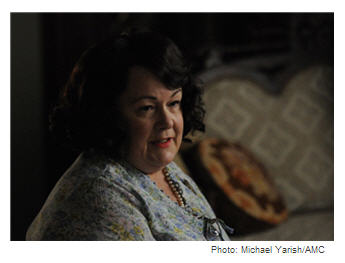 Mathew Weiner again offers clever (and unexpected) stirrings of social issues.
Mathew Weiner again offers clever (and unexpected) stirrings of social issues.
Are the tea leaves suggesting a window into his imagined future for these characters as well as the tumultuous end of the decade – women as increasingly vocal and significant, feminism on the horizon, youth taking control more quickly than the Establishment can process?
The Fat Issue, Birth of Body Image Insanity
I am surprised to see that “fat” as an issue is tackled, with the usual combination of directness and nuance we’ve come to expect in Mad Men.
Fat as a feminist issue has not yet been articulated (stay tuned for the 1970s, and the book by that name in 1978). Yet weren’t the judgmental assumptions concerning fat people – fat women in particular – already prevalent?
Isn’t this the infancy of the eating disorders so flagrant in the late 1970s and 1980s? Weren’t these years the beginning of women undergoing incredible changes in society, when roles were blurring and without any means to predict the subsequent complexities of the future? Wasn’t food often the drug of choice, or refusing to consume food – as a means to combat powerlessness?
Don’t we hear disapproval even in Betty’s tone as she talks about her domineering mother-in-law, Pauline, whom she calls obese? Isn’t it clear that Betty feels ashamed – perhaps teaching her humility for the first time in her life? Or will she stay on automatic, using food to anesthetize?
A Journey for Betty
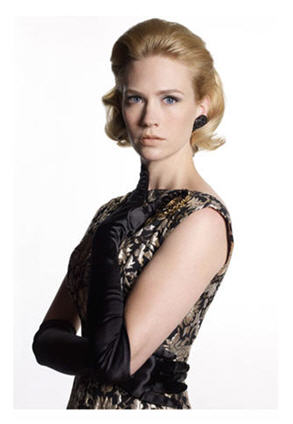 When it comes to Betty, I feel as though I ought to tick off even more questions, à la 1960s soap operas.
When it comes to Betty, I feel as though I ought to tick off even more questions, à la 1960s soap operas.
- Will our former Grace Kelly Ice Princess be able to adjust to changing times?
- Will Betty begin to appreciate Henry, and get her act together?
- Will she give voice to regrets about her hasty departure from her marriage?
- How bitter is she that Don married a woman she refers to as “a 20-year old” – who is young, pretty, and thin?
- Will Don’s feelings for Betty re-emerge following the cancer scare?
Most of us know that January Jones, who plays Betty Draper Francis, gave birth last year. We can only imagine we’ll be seeing her more svelte figure return, though I nonetheless hope that the show explores these under-discussed topics of bias in our culture – the issues of women and body image which were born out of the 60s and 70s and continue to plague us.
More articles of interest on women, body image, and of course, Mad Men:
Season 4 portrait of Betty, Frank Ockenfels. All other images by Michael Yarish / AMCTV.com. Click images to access originals on AMC site in full size.

For more musings and reviews on Mad Men, pop by here.
© D. A. Wolf
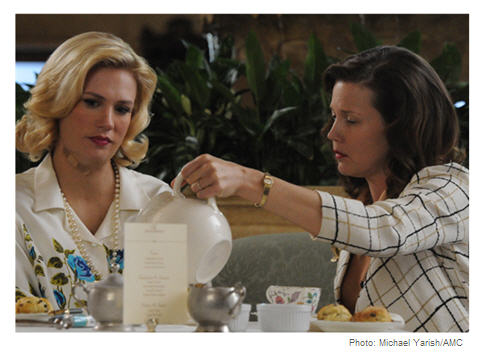
A good episode for setting up the future but no real sparkle. I would add that Roger seems to be developing a drinking problem even compared to the baseline of non-stop drinking in their world. The context that the world is changing keeps coming up, Roger’s last line about wishing things would just return to the way they were seems foretelling; there is no turning back the clock then or now.
I tend to think of Mad Men as a story I can’t put down, that I’m going through chapter by chapter. I don’t expect every chapter to be sparkling, batticus, but I expect the story to be moved along, and to know more about the characters. So, I haven’t been disappointed yet.
Granted, last night’s episode didn’t have the hook of a Bisou Bisou number. Still, seeing Betty in her current state was no small surprise.
This did seem to be a “chapter” setting up future events. But as usual, we don’t know which way the plotlines will go, which is one of the things I like about this show. And Roger’s drinking is worrisome, yes. (Wondering what sort of Baby Daddy he’ll make to Joan’s son, as he grows more depressed, and more distant from his own second wife?)
I just recently downloaded all the seasons. I had been hearing so much I thought I would check it out. I can say I LOVE the show. I love everything about the times and the story line. I wish it would have lingered a little longer in the earlier phases.
I hope Betty stays on the show. It seems the two still care for each other.
So happy to hear from another Mad Men fan! And I agree. It does seem that the connection between Don and Betty remains, despite everything they’ve been through. Or maybe, because of it.
Hope you drop by often!